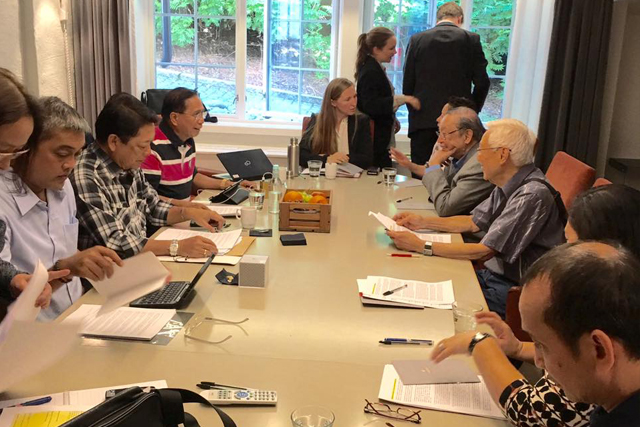NDFP sees progress toward interim peace deal

The peace panel at an informal meeting with the Communist Party of the Philippines-New People’s Army-National Democratic Front headed by Jose Ma. Sison in Oslo, Norway in 2016. Jesus Dureza, Facebook, file
BAGUIO CITY, Philippines — The Philippine government and communist rebels may reach an interim peace agreement soon, according to a panel of the National Democratic Front of the Philippines.
The NDFP represents the Communist Party of the Philippines-New People's Army in peace talks with the government.
Julie de Lima, chairperson of the NDFP's Reciprocal Working Committee on Socio-Economic Reforms (RWC-SER) said the possibility of an interim peace agreement “is a sign of movement in the stalled peace negotiations.”
De Lima, who is the common-law wife of Communist Party of the Philippines founder and NDFP chief political consultant Jose Maria Sison, said that "this would be a significant development in the peace process, only if the interim peace agreement includes basic social reforms."
The NDFP has maintained that social and economic reforms must be the cornerstone of any peace agreement, she explained in a statement.
De Lima added that the inclusion of Agrarian Reform and Rural Development and National Industrialization and Economic Development in the interim peace agreement “would be the most significant step in the peace negotiations,” while adding that, “it would be the first step towards addressing the roots of the armed conflict.”
Earlier, government peace panel member Hernani Braganza also underscored the importance of resolving agrarian problems to address the root causes of rebellion.
De Lima said that bilateral teams of the RWC-SER have agreed on the common drafts of ARRD and NIED. The still unresolved contentious issues are being referred to the RWC-SERs of the two parties for resolution before negotiations at the level of the GRP-NDFP negotiating panels.
Both the ARRD and NIED are two major sections of the Comprehensive Agreement on Social and Economic Reforms, the second substantive agenda in in the GRP-NDFP peace negotiations.
The first substantive agenda — the Comprehensive Agreement on the Respect for Human Rights and International Humanitarian Law — was signed in 1998.
Other parts of CASER that still need to be discussed are Environmental Protection, Rehabilitation and Compensation, Rights of the Working People, Monetary and Fiscal Policy and Foreign Economic Trade relations.
"Genuine agrarian reform with rural industrial development and national industrial and economic development that benefits and protects the rights of the working people are among the many issues at the heart of any peace agreement," De Lima stressed.
She also said that "[a] ceasefire alone will not resolve the centuries-old problems from which the Filipino masses have struggled to break free."
Parties are expected to return to the formal negotiating table in June 2018.
- Latest
- Trending





























